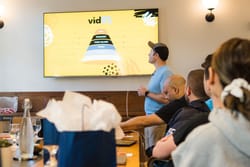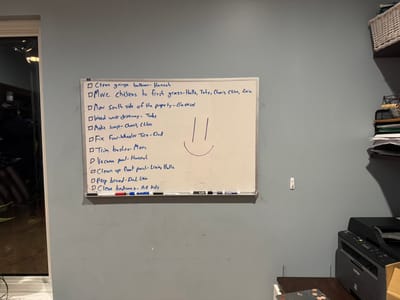Five years ago I researched the impact that screen time has on child development and, because of it, made significant changes in our home. Here's what I learned about raising digitally healthy children and the impact it's had on our family since then. 📱
Back in 2020, our home was so chaotic that we needed to hit a reset button. Our kids were constantly bickering, complaining about being bored, and exhibiting general restlessness. If you have one or two kids, you can probably deal with it, but when you have 7, no way.
I reached out to a dad of another large family and he suggested that Dana and I eliminate our kids' screen time, white flour, and processed sugar for 12 months. The research suggested 2-4 weeks for neurochemical recalibration, then a full year for pathway rewiring.
We were desperate enough to try it.
The first two weeks were absolute chaos. Apparently the kids were used to regulating themselves with screens – something that would shut-off their brains and literally make them lie still. Usually, when the fussing got to be too much, Dana would give the kids the iPad, but she lost her fall-back solution, making it a rough several weeks for everyone.
But after week 2, something shifted. The, "I'm bored," complaints disappeared and our kids started genuinely playing together. Bickering decreased. They became content and were genuinely curious about the world around them. They played outside for hours and loved it.
For the entire year: no screens, and white flour and sugar were treats only for dessert on Friday nights. It changed our family.
A year later we introduced screens again, but this time as a communal experience where we watch one movie together every two weeks instead of using screens to isolate and change behavior. Screen time was now a bonding experience instead.
Fast forward to today. Dana and I have wrestled through what it would look like to progressively give our children more digital independence as they grow up. We currently have two kid phones that are restricted to contacts and apps we approve and no Internet access. If one of the kids is leaving the house, they can take one of the phones with them.
But, as our kids get older, how much more freedom is appropriate to give them?
Today my oldest teenager turns 16 and we will unlock one of the kid phones. It's not a gift because we want to reserve the right to take it back later if needed, but so far she's shown that she handles text messages and emails with her friends with maturity.
So, while this could change from kid to kid, here's where we landed with next steps for her:
We're unlocking a kid phone with...
- 🌐 Web browsing
- 📞 Unlimited contacts
- 🤳 Unlimited texting
- 📱 App store access
The restrictions are:
- 🔒 2 hour daily time limit. (It's her choice on how to spend it.)
- 🔒 No social media until 18. (The research on teen mental health is too compelling. Read, "Anxious Generation," by Jonathan Haidt.)
- 🔒 Dana and I still monitor her usage and communication for accountability. (She actually appreciates this structure.)
Most people think the Amish are against modern technology, but someone told me they're really not. It's just that they ask a question that most of us today don't think to ask:
"If we adopt this technology, what impact will it have on our community?"
Cars spread communities apart. Individual entertainment isolates us. Phones mean we no longer have to connect face-to-face.
Each tech choice provides a convenience, but also a consequence. It's wise to evaluate the impact of the tools we use, both on ourselves and our children. (I removed most social media apps from my phone and love that I no longer spontaneously disassociate from reality when I have a few moments to spare.)
Our family is not anti-technology; we're pro-intentional technology that serves relationships rather than competing with them.
If you're wrestling with how you raise digitally healthy children, here's a few questions to consider:
- 💬 How often are you having quality conversations as a family?
- 🧩 Are your kids developing creative problem-solving skills?
- 😌 How well do they manage their emotions and stress?
- ❤️ Do you feel genuinely connected to each other?
Dana and I are still wrestling through a lot of this in our family: What digital freedoms make sense at different stages? How do we balance autonomy with family time? What level of accountability feels supportive vs. invasive?
We don't have it all figured out. And thankfully the goal isn't to get it perfect for each teenager – it's to create sustainable systems that support gradual independence while maintaining the relational connection that's important to us.







